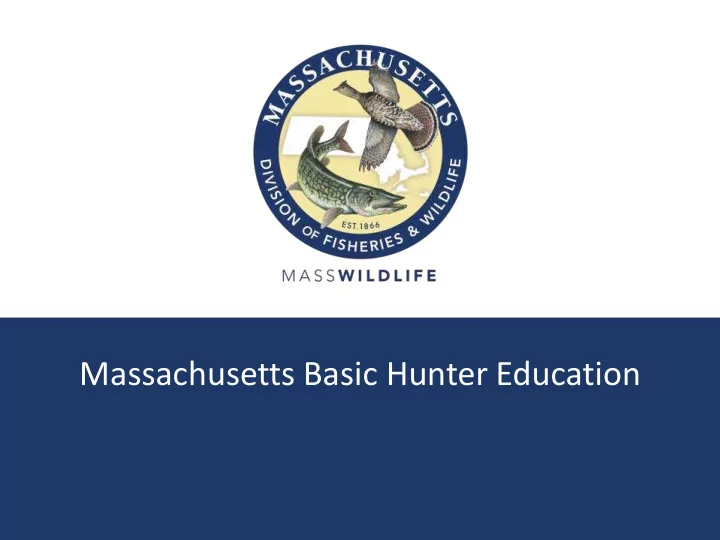

Massachusetts Basic Hunter Education
Objectives Basic Hunter Education Course
Instructors • Name • Background/Profession • Hunting/Shooting Interest
Housekeeping Parking Rest Rooms Breaks Firearms Phones
Agenda The Dates and Times for this course are:
Agenda The Dates and Times for this course are: Some of the topics we will be teaching: Introduction • Firearms Basics & Safety • Laws & Ethics • Hunting Opportunities • Firearms Handling & Field Safety • Personal Preparedness & Survival • Wildlife Conservation & Game Care • Final Exam •
Activities • Lecture • Open discussion • Hands-on activities • Small group work
Successful Completion All graduates receive a certificate of completion o 80% or better on exam o Express mature and responsible attitude • Give honest effort in class • Demonstrate safe gun handling Certificate of completion used o to purchase MA hunting or sporting license o to make application for MA Firearms License Certificate recognized in North America
Questions?
Chapter 1 • Introduction to Hunter Education
Objectives At the end of this lesson, you will be able to: • identify the purpose and importance of hunter education; • identify hunters and recreational hunting as key to wildlife conservation; • describe the central principles of the N. A. Model of Wildlife Conservation; • and describe how license fees and excise taxes support wildlife conservation.
Course Importance Hunter Education is important because it:
Course Importance Hunter Education is important because it: • decreases hunting-related shooting incidents and other hunting injuries • promotes responsible hunter behavior to ensure the future of the tradition
Course Goal The goal of hunter education is to produce hunters that are ….
Course Goal The goal of hunter education is to produce hunters that are …. safe, responsible, knowledgeable, and involved.
Conservation Funding • State/Provincial Wildlife Agencies o Sportsmen and Sportswomen pay for conservation
Conservation Funding • State/Provincial Wildlife Agencies o Sportsmen and Sportswomen pay for conservation • U.S. Fish and Wildlife Service Federal Aid in Wildlife Restoration Act – 1937 “Pittman-Robertson”
Conservation Funding cont… International Hunter Education Association •
Conservation Funding cont… International Hunter Education Association • Other Non-governmental Organizations • (NGOs) Some promote shooting sports o Some work for species/habitat conservation o
Conservation Funding cont… International Hunter Education Association • Other Non-governmental Organizations • (NGOs) Some promote shooting sports o Some work for species/habitat conservation o Local Sportsmen’s and Civic Clubs •
Conservation Funding cont… International Hunter Education Association • Other Non-governmental Organizations • (NGOs) Some promote shooting sports o Some work for species/habitat conservation o Local Sportsmen’s and Civic Clubs • Local Businesses •
N.A. Model of Wildlife Conservation The Seven Pillars: Wildlife as a Public Trust Resource •
N.A. Model of Wildlife Conservation The Seven Pillars: Wildlife as a Public Trust Resource • Elimination of Markets for Game •
N.A. Model of Wildlife Conservation The Seven Pillars: Wildlife as a Public Trust Resource • Elimination of Markets for Game • Allocation of Wildlife by Law •
N.A. Model of Wildlife Conservation The Seven Pillars: Wildlife as a Public Trust Resource • Elimination of Markets for Game • Allocation of Wildlife by Law • Kill only for legitimate purposes •
N.A. Model of Wildlife Conservation The Seven Pillars: Wildlife as a Public Trust Resource • Elimination of Markets for Game • Allocation of Wildlife by Law • Kill only for legitimate purposes • Wildlife as an International Resource •
N.A. Model of Wildlife Conservation The Seven Pillars: Wildlife as a Public Trust Resource • Elimination of Markets for Game • Allocation of Wildlife by Law • Kill only for legitimate purposes • Wildlife as an International Resource • Science-based Wildlife Policy •
N.A. Model of Wildlife Conservation The Seven Pillars: Wildlife as a Public Trust Resource • Elimination of Markets for Game • Allocation of Wildlife by Law • Kill only for legitimate purposes • Wildlife as an International Resource • Science-based Wildlife Policy • Democracy of Hunting •
Questions? • What is the goal of the hunter education program? • What does the Pittman Robertson Act accomplish? • What makes the North American Model of Wildlife Conservation so unique?
Recommend
More recommend